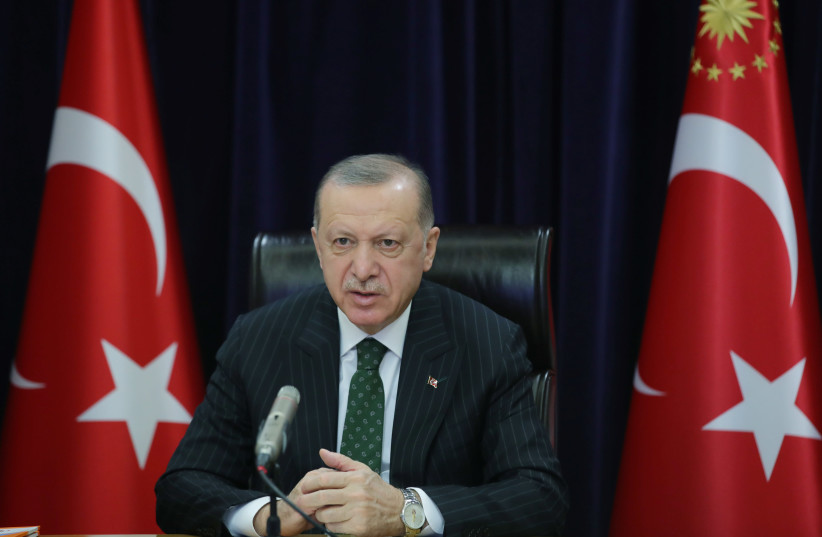The US said on Wednesday it wanted NATO allies to “remain focused” and cooperate amid Russian aggression as tensions rose between Turkey and Greece.
For more stories from The Media Line go to themedialine.org
In response to a question on relations between the neighboring rivals, US State Department spokesperson Ned Price told reporters that Ankara and Athens should avoid “actions that could inflame tensions” and that disputes should be resolved diplomatically.
“We encourage countries around the world, particularly our NATO allies, particularly as we are facing a collective threat from the Russian Federation, not only what it’s doing in Ukraine but the threat it poses to the broader region, to remain focused, to remain focused on the threats that are a challenge to all of us.”
Ned Price
“We encourage countries around the world, particularly our NATO allies, particularly as we are facing a collective threat from the Russian Federation, not only what it’s doing in Ukraine but the threat it poses to the broader region, to remain focused, to remain focused on the threats that are a challenge to all of us,” Price said during a press briefing on Wednesday.
He reiterated that Greece had sovereignty over its islands near Turkey after Ankara claimed that Athens was stationing armored vehicles there.

Why have tensions between Greece and Turkey been rising?
Tensions between the two NATO member states have been rising for months and the last week saw fresh accusations that drew in the US.
The Turkish state news agency reported on Monday that Turkey complained to the US and Greece over US-made armored vehicles that were allegedly put on Greek islands.
Ankara says those islands should be demilitarized because they have nonmilitary status according to international law.
Last Friday, Greek Prime Minister Kyriakos Mitsotakis said during an address to the UN General Assembly that his country was not an enemy of Turkey’s but argued the country was using “the language of an aggressor.”
Berk Esen, an assistant professor of political science at Istanbul’s Sabanci University, said the armored vehicles on the islands are a genuine concern but the militarization of the islands has been an issue for a while and current rhetoric could be due to domestic politics.
“Both sides, I think, are trying to escalate the conflict in order to mobilize the national public opinion so that they can win elections. I think this is true for Turkey as much as it is true for Greece,” Esen said.
He believed that both countries’ leaders would be able to use the rhetoric without the dispute leading to a direct clash.
Last week’s claims are the latest in long-running disputes between the two countries that have included the treatment of migrants who are trying to enter the European Union through Greece, as well as drilling for oil in disputed waters.
Turkey's Erdogan gets political boost in flaming tensions with Greece
Rhetoric against Turkey’s long-time regional rival Greece will play well with Turkish President Recep Tayyip Erdogan’s nationalist base.
The Turkish president has been struggling in the polls while grappling with an economic crisis and massive inflation less than a year ahead of national elections.
“I think the publicity of it especially is politically driven,” said Ryan Bohl, a Middle East and North Africa analyst with RANE/Stratfor, who added that the tension with Greece was also a way for Turkey to remind NATO about its importance as a member state amid the war in Ukraine.
For years, Erdogan has moved closer to Russian President Vladimir Putin in what analysts believe is an attempt to decrease his country’s reliance on the West and NATO.
Turkey has stood in line with the military alliance in support of Ukraine while maintaining ties with Russia, especially for financial gain.
Turkey’s geography, bordering Syria, Iraq, and Iran, makes it an especially valuable ally, with its southern military base, İncirlik, used by the US in its fight against ISIS
Esen said Ankara is concerned that the US could be establishing a base similar to İncirlik on the Greek islands.
Bohl stated that, while there was no immediate military threat to Turkey, the further away Greek forces were from the country, the safer Ankara felt.
“I think they are trying to [expand] a buffer space with the Greek military,” he said.
Bohl believed the US would try to mediate between Greece and Turkey and make offers so that Ankara accepts the deployments.
One possibility could be that the White House would push for Turkey to get F-16 fighter jets, which needs the approval of Congress.
Ankara is especially in need of the jets to upgrade its aging fleet after it was kicked out of the US’s F-35 fighter jet system in retaliation for buying a Russian anti-missile air defense system.
Another possible offer, Bohl said, is for the US to decrease its threats of sanctions against Turkish banks.
Last month, the US Treasury warned a top Turkish business association that companies could face sanctions if they work with sanctioned Russian individuals.
“I think the US realizes that this is an area that’s sensitive to Turkey and they want an amicable de-escalation,” Bohl said.
“The American interest will be to restore the calm between two NATO allies.”
